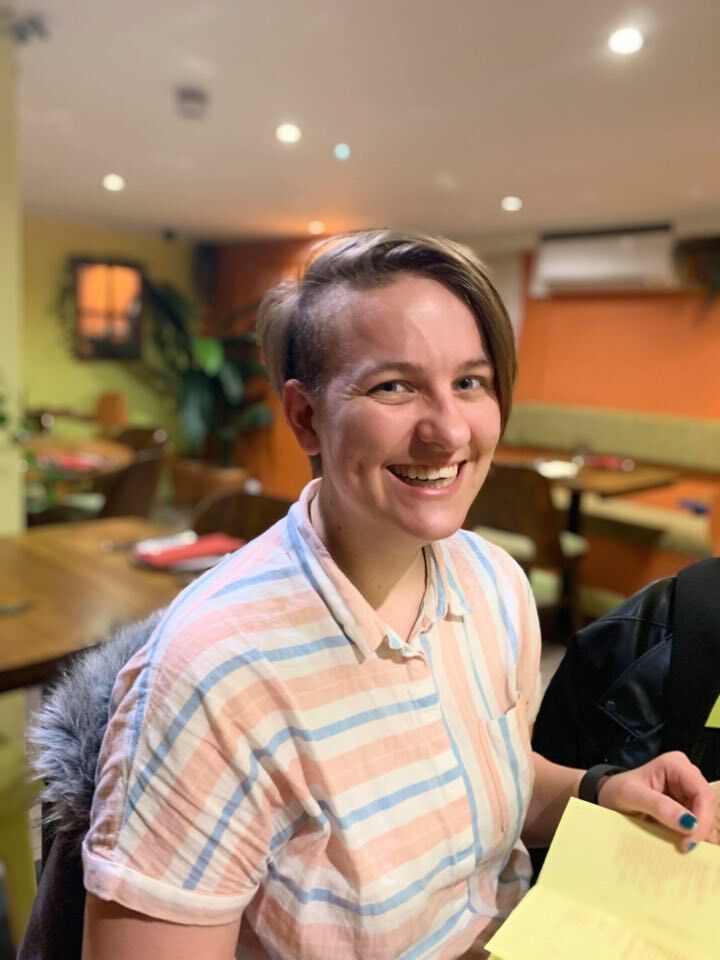Hi! Welcome back to another blog. This month, we have decided to shine a spotlight on the behind the scenes of ELT publishing – follow us on Twitter, Facebook, Instagram and LinkedIn to keep up to date with that.
Today, we wanted to talk about getting into publishing. We spoke to some of our younger staff members who work across Sales & Marketing, Production, Editorial, and Digital for any tips they have for landing your first job in publishing.
Tips from Jaz, Digital Editor

I’m the Digital Editor at Garnet! I’m 25, and I’ve worked in publishing for almost two and a half years. I started at Garnet as a part-time intern, before moving on to assistant level, and finally landing my current role. I wrote a staff profile when I was a Digital Assistant, which you can look at here! When I initially started applying for jobs and internships, I found it quite daunting, and also wasn’t sure what particular area of publishing I wanted to work in. I had no publishing experience, and was casting my net as widely as possible! I actually hadn’t considered working in ELT publishing – I didn’t even know it was a thing! I would say definitely keep your eyes peeled for all sorts of opportunities from lots of different publishing houses. Jobs may come up you didn’t know existed, from publishing houses you’ve never heard of! You’re not going to land your dream job on the first go, so be open to considering avenues you perhaps hadn’t thought about.
Here are some tips of things I’ve learnt along the way, as well as some useful resources:

- A really important and valuable place to be is Twitter – a lot of publishers are active on there, and will advertise jobs there too. Find publishing houses, imprints, and independent publishers and follow them. If you are interested in social media, publicity, marketing etc., then following them is important so you can see what type of content and campaigns they are putting out. Some great accounts to also initially start following are @Thatpubblogger, @pubinterns, @_CreativeAccess and @SYP.
- This applies less to ELT publishing but is still valuable, and something you may already be doing … but if you’re not – start a book blog/booktube channel/bookstagram account. It’s a great way to engage with the book community, and with publishers, whilst also showcasing your writing and editorial skills. It’s also an excellent way to keep up to date, and show you know the market of whatever field you are aiming to work in.
- Lastly, especially whilst it’s hard to get experience outside of your own home right now, I would really recommend signing up for the free trial of LinkedIn Learning. They have so many courses available, from personal development to specific tutorials on programmes and software. It’s definitely worth taking a look.
Tips from Alice B, Publishing Assistant

Hi, I’m the Publishing Assistant at Garnet. I’m 24, and I’ve worked full time in publishing for just over a year and a half, but had some sporadic experience before that while I was still at university. This is my staff profile from about a year ago, if you’d like to check it out.
The biggest thing I’d say to keep in mind when you’re trying to get into publishing is not to get disheartened. It’s very common to spend months and months applying with little to no response, and it’s easy to let that get you down. Spend that time getting involved if you can, and, of course, reading as much as possible!
Here are some of my top tips:

- My first tip is, if you’re still at university, get as involved as you can in anything that might be relevant. My university has a yearly creative writing publication which I was on the editorial team for, but there are plenty of other options. Lots of universities have magazines or newspapers students can work on, offer to write the newsletters for your clubs and societies, work on the yearbook if you’ve got one!
- Next up I’d suggest volunteering at literary festivals and related events. This shows that you’re passionate about the industry and willing to get involved however you can. It also usually indicates that you work well in a team, aren’t afraid to jump in the deep end, and, depending on the event, are able to keep your cool in front of the talent. It’s also a good way to start networking – if you’re friendly and you do a good job, people might remember you later. Or they might even be happy to be a reference for you! Of course, many events aren’t running at the moment, so this may be a tip to implement a few months down the track. But there are several events which have moved online, and if you can help out with those, that experience will be just as valuable, if not even more relevant in the current climate.
- And, of course, one of the best ways to get direct experience is through work experience or internships. Lots of publishing companies have excellent schemes and, as Jaz mentioned, Twitter is a great place to find these. But also keep your eyes open for any opportunities that might pop up around you. I was extremely lucky finding my internship – one of my professors casually mentioned that he was starting an indie poetry publishing company, and I basically badgered him until he let me do some work for him. Keep a look out for any experience you can get, and don’t be afraid to work on something that’s a little outside of your comfort zone or area of interest. Any experience is good experience, even if it’s not directly relevant. It’s all about transferable skills!
Tips from Alice W, Sales & Marketing Intern

I’m the Sales & Marketing Intern at Garnet! I’m 22, and I’ve worked in publishing for nearly seven months now (I’m a newbie), but I did gain some experience through small internships and jobs whilst at university. Like Jaz and Alice B said, it’s so important to keep your options open and look at all aspects of publishing, whilst also not getting disheartened by rejections. I think it’s also really important to not overlook the things about yourself that may seem unimportant or irrelevant when it comes to writing your CV and cover letter. Whether it be using spreadsheets in an admin job, writing your own editorial notes for books you’ve read, or trawling through Goodreads for new books in your spare time – everything is relevant!
Here are some of my top tips that helped me when getting into publishing:

- I really recommend making a list of publishers and literary agencies and sending your CV out to them. Even if they’re not advertising, it gets your name out there and they’re more likely to recommend you to a friend or colleague. If you’re unsure where to start with making your list, you can have a look at the directories (listed below), or another good way is to go through the books you own and write down the publishers/imprints and agencies that publish them. This will give you a wide list of places you can apply to (both mainstream and indie), as well as a list of places that publish books that you are interested in. This will also allow you to be more specific with your application, which follows on to my next tip …
- When interviewing for jobs and internships, it’s also really important to have a specific idea of what genres and authors appeal to you – employers always want to hear that you’re passionate! Anyone can say they love books though, so if you’re specific and have examples of books and authors to back up what you’re saying, it’ll make you stand out. If you’re not sure what books you do like, look at bestseller lists regularly e.g., Waterstones, Apple Books, the Bookseller, Goodreads, etc. Not only is this a good way to help you discover new books you might like, but it’s also a great way to keep up to date with book trends!
- Lastly, sign up for job alerts and check job boards regularly. Some of the main ones I used were the Society of Young Publishers (you have to pay a membership fee, but it’s definitely worth it – it’s how I found out about the internship at Garnet!), the Bookseller, IPG (Independent Publishers Guild) and Book Brunch. A lot of job vacancies can be quite hidden or only advertised on certain websites, so it definitely takes a bit of detective work to find them!
Thank you Jaz, Alice B and Alice W! We hope these tips were helpful. We have also compiled a list of resources below, including newsletters to sign up to, articles and posts to read, as well as specific information for people wanting to get into ELT publishing.
Specific classes, courses and events you can sign up to:
- The Book Machine run an unplugged 2020 series which are currently virtual events and which delve into specific areas of publishing. The next two are Marcomms and Design.
- Sign up to The Flip newsletter – This newsletter showcases women working in the publishing industry.
- The Publishing Post – A new magazine for people wanting to learn more about a career in publishing. You can read Issue 1 here.
- Publishing Hopefuls Facebook group – A group for people wanting to work in publishing.
- Society of Young Publishers – Various online courses and events, including a new Trailblazer series all about diversity in publishing, which they have just launched. You can check out episode 1 here.
- Bloomsbury – Events and masterclasses
- Linkedin Learning offer a one month free trial and have lots of great classes.
- For those interested in marketing, Google Digital Garage offer a free online Digital Marketing course which includes certification.
- Listen to the Slumbering SlothCast – a podcast dedicated to creative careers and talking to people in the industry.
Helpful lists and blog posts with resources and advice:
- Ain’s Notes: Getting into Publishing
- Pub Interns: FAQ: How do I write a cover letter?
- PRH blog: Publishing terminology explained
- Association of Authors’ Agents – Features a list of literary agencies and contact details.
- Booksellers Association – Features a list of publishers (a lot of small and independent companies) and contact details.
- Self worth and stress whilst job hunting – our Digital Editor, Jaz, wrote a blog post all about keeping your mental health in check whilst job hunting.
Specific tips for getting into ELT publishing:
- https://www.tefl.org/ – think about whether you want to get experience as an English Language teacher first.
- Keep up to date with ELT news and trends. A good place to start is the EL Gazette, as well as the British Council.
- There are lots of free webinars you have immediate access to on IATEFL – as expected, teaching online is a major focus at the moment, and there is a free webinar where you can learn more.
- Career paths in ELT publishing: https://www.usingenglish.com/articles/career-paths-in-elt-publishing.html
- Listen to the TEFLology podcast – a podcast about teaching English and applied linguistics.
- Listen to ELTtime – our very own podcast where we chat about all things ELT and ELT publishing. A good episode to listen to first would be TeaBreak: How well does teaching English prepare you for a career in ELT publishing?
Thank you so much for reading – we hope these tips were useful for you!


